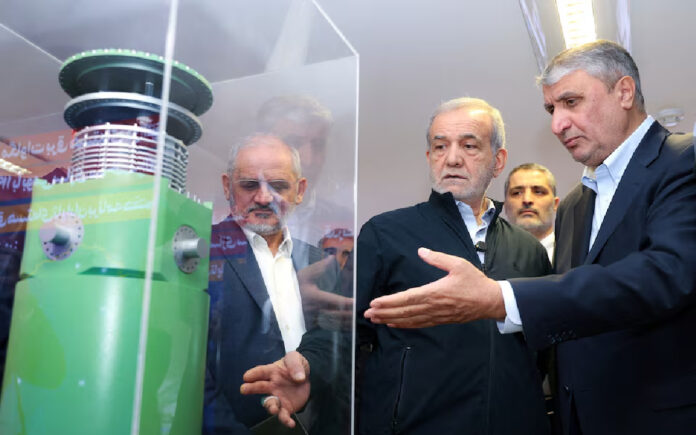Paris: The United States’ decision to exclude its European allies from recent nuclear negotiations with Iran in Oman has raised concerns among diplomats and analysts, who warn that sidelining the E3 — Britain, France, and Germany — could weaken U.S. leverage and increase the likelihood of military action by either Washington or Tel Aviv.
According to three European diplomats, the U.S. did not inform its European counterparts about the Oman talks prior to former President Donald Trump announcing them publicly on Tuesday. This move came despite the fact that the E3 holds a critical card — the potential to trigger the snapback mechanism to reimpose United Nations sanctions on Tehran.
The West has long accused Iran of attempting to develop nuclear weapons — a charge Tehran denies. Renewed sanctions are seen as a means to pressure Iran into accepting tighter controls, but the European diplomats said substantive discussions with the U.S. on coordinated strategy have yet to take place.
Since the U.S. unilaterally withdrew from the 2015 Joint Comprehensive Plan of Action (JCPOA), it has lost the authority to trigger the snapback mechanism at the UN Security Council. This leaves the E3 as the only JCPOA participants both capable and potentially willing to initiate the process. Analysts believe that coordinated action is crucial, especially given that Israel has reportedly urged the E3 to move forward with snapback.
The three diplomats stated that the E3 had already warned Iran they would invoke the mechanism by the end of June. Iran, in response, cautioned that such a move would have “harsh consequences” and prompt a reassessment of its nuclear doctrine.
“The E3 do not trust the United States because it is taking initiatives without them being consulted,” said a senior European diplomat.
Trump’s 2018 withdrawal from the deal — which was also signed by Russia and China — dismantled a framework that had curbed Iran’s nuclear program in exchange for sanctions relief. Russia, for its part, opposes the reinstatement of sanctions.
Under the terms of the JCPOA, any party to the deal can initiate a 30-day snapback of sanctions if disputes over Iranian compliance cannot be resolved. However, this option will expire when the accord formally ends on October 18.
Since the U.S. departure, the International Atomic Energy Agency (IAEA) has reported that Iran has significantly exceeded the deal’s uranium enrichment limits, producing stockpiles near weapons-grade levels — far beyond what Western nations deem necessary for a civilian energy program.
Unilateral Strategy Resurfaces
The current U.S. posture mirrors Trump’s earlier preference for unilateral engagement, seen not only in Iran policy but also in Washington’s recent direct talks with Russia over Ukraine — another instance where European allies felt marginalized.
European officials acknowledged that meetings with American counterparts have occurred but said they lacked the depth and coordination required for joint diplomatic strategy. Even scheduling a meeting with U.S. Secretary of State Marco Rubio at the NATO Foreign Ministers’ summit proved difficult, according to three E3 officials.
When asked whether they had prior knowledge of the Oman talks, the foreign ministries of Britain, France, and Germany did not provide direct answers.
“We remain committed to taking every diplomatic step to prevent Iran from developing nuclear weapons, including through snapback if necessary,” said a spokesperson for the British Foreign Ministry.
Also Read | New York Helicopter Tour Ends in Disaster Over Hudson River
France’s Foreign Minister Jean-Noel Barrot offered a more muted response, stating only that the French “take note with interest” of the U.S.-Iran discussions.
The White House National Security Council and the U.S. State Department declined immediate comment on the snapback issue or on coordination with European allies.
Europe-Iran Dialogue Continues
European engagement with Iran stretches back two decades, with the E3 having launched trilateral talks as early as 2003. In the 2015 agreement, the ability to trade with European markets was one of the key incentives for Iran.
Despite being sidelined from the U.S.-led Oman talks, the E3 has remained active diplomatically. In recent months, Europe has coordinated with the U.S. in pressuring Tehran at the UN atomic watchdog and has imposed new sanctions targeting Iran’s ballistic missile program, the detention of foreign nationals, and its military support for Russia in the Ukraine war.
Also Read | Moscow Says Its Troops Control Zhuravka in Ukraine’s Sumy Region
Following Trump’s re-election but before he assumed office, the E3 initiated exploratory talks with Iran, which began in September and are ongoing. These discussions, European diplomats say, are aimed at exploring whether a new, more limited set of restrictions could be negotiated before the JCPOA expires.
According to those diplomats, Iranian representatives have frequently questioned them about the intentions and policies of the new U.S. administration.
“Iran believes that talks with the E3 and other parties to the nuclear deal can help defuse tensions over its nuclear programme and can be complementary to talks with the U.S.,” said an Iranian official.



